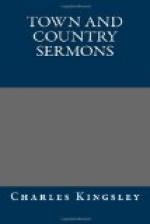I think that I can take no better text for the subject on which I am about to preach, than that which the Gospel for this day gives me.
For is not such a great city as this London, at least in its present amorphous, unorganised state, having grown up, and growing still, any how and any whither, by the accidental necessities of private commerce, private speculation, private luxury—is it not, I say, literally a wilderness?
I do not mean a wilderness in the sense of a place of want and misery; on the contrary, it is a place of plenty and of comfort. I think that we clergymen, and those good people who help our labours, are too apt exclusively to forget London labour, in our first and necessary attention to the London poor; to fix our eyes and minds on London want and misery, till we almost ignore the fact of London wealth and comfort. We must remember, if we are to be just to God, and just to our great nation, that there is not only more wealth in London, but that that wealth is more equitably and generally diffused through all classes, from the highest to the lowest, than ever has been the case in any city in the world. We must remember that there is collected together here a greater number of free human beings than were ever settled on the same space of earth, earning an honest, independent, and sufficient livelihood, and enjoying the fruits of their labour in health and cheapness, freedom and security, such as the world never saw before. There is want and misery. I know it too well. There are great confusions to be organised, great anomalies to be suppressed. But remember, that if want and misery, confusion and anomaly were the rule of London, and not (as they are) the exception, then London, instead of increasing at its present extraordinary pace, would decay; London work, instead of being better and better done, would be worse and worse done, till it stopped short in some such fearful convulsion as that of Paris in 1793. No, my friends; compare London with any city on the Continent; compare her with the old Greek and Roman cities; with Alexandria, Antioch, Constantinople, with that Imperial Rome itself, which was like London in nothing but its size, and then thank God for England, for freedom, and for the Church of Christ.
And yet I have called London a wilderness. I have. There is a wilderness of want; but there is a wilderness of wealth likewise. And the latter is far more dangerous to human nature than the former one. It is not in the waste and howling wilderness of rock, and sand and shingle, with its scanty acacia copses, and groups of date trees round the lonely well, that nature shews herself too strong for man, and crushes him down to the likeness of the ape. There the wild Arab, struggling to exist, and yet not finding the struggle altogether too hard for him, can gain and keep, if not spiritual life, virtue and godliness, yet still something of manhood; something of—




